|
|
|
Sort Order |
|
|
|
Items / Page
|
|
|
|
|
|
|
| Srl | Item |
| 1 |
ID:
132793
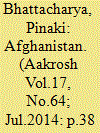

|
|
|
|
|
| Publication |
2014.
|
| Summary/Abstract |
General Boris Gromov, commander of the 40th Army of the Soviet Union, crossed the 'Friendship' bridge linking the Salang Pass on 15 February I989. hack to the motherland. Najibullah. the Afghan president and a Communist protege' of the USSR regime of Mikhail Gorbachev, was ousted from power in April 1992. The intervening three years have a story to tell to the various protagonists of the current Afghan drama being enacted right now as another superpower gets ready to decamp without completing what it set out to do. The Red Army had left in early I989, and its nominee, Najihullah. held on to power for another three years on the strength of the same Afghan army that had desertions, remained fragmented in factional lines - the Parchams and the Khalqis - and was depleted in terms of resources.
|
|
|
|
|
|
|
|
|
|
|
|
|
|
|
|
| 2 |
ID:
131852
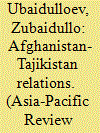

|
|
|
|
|
| Publication |
2014.
|
| Summary/Abstract |
This article attempts to touch upon the relations between Afghanistan and Tajikistan, two neighboring countries, from the historical perspective and the current period. The article analyses the history of Afghanistan-Tajikistan relations during and after the Soviet era, especially during the Afghan Mujahideen's struggle against the Soviet occupational army and Taliban regime in Afghanistan, the Tajikistan civil war of 1992-1997, and after September 11, 2001. In addition, the issues of the ethnic Tajiks in Afghanistan, the violent and vulnerable Tajik-Afghan border, the withdrawal of NATO troops from Afghanistan in 2014 and its impact on Afghanistan-Tajikistan relations, and the new phase of economic relations and an effective cooperation between the both countries are discussed. The article tries to fill the gaps within the body of existing literature and understanding concerning the topic.
|
|
|
|
|
|
|
|
|
|
|
|
|
|
|
|
| 3 |
ID:
132032
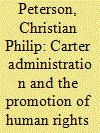

|
|
|
|
|
| Publication |
2014.
|
| Summary/Abstract |
This article will examine the effectiveness of the Carter administration's efforts to promote human rights in the Soviet Union. It will pay particular attention to how human rights promotion fit into a larger approach to transforming Superpower relations in ways favorable to U.S. interests called "reciprocal accommodation [détente]." The use of this framework provides an excellent way to tease out the complexities of how the administration balanced the promotion of human rights in the USSR with other important objectives such as concluding the SALT II treaty. It also helps reveal how executive branch worked to reduce Soviet human rights violations by citing the provisions of the Final Act and working with private citizens to raise international awareness about human rights issues. Without losing sight of his administration's inability to protect Soviet dissenters from arrest and harassment, this article will demonstrate that Carter had every intention of making the issue of human rights an important element of Cold War competition and implementing a new approach to détente that at least in part aimed at transforming Soviet internal behavior.
|
|
|
|
|
|
|
|
|
|
|
|
|
|
|
|
| 4 |
ID:
131790
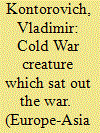

|
|
|
|
|
| Publication |
2014.
|
| Summary/Abstract |
A substantial body of literature argues that government funding motivated by the Cold War shaped (or distorted) the content of the American academic disciplines. This article tests the impact of such funding on the academic study of the Soviet economy, a small field created to help fight the Cold War. It documents the amount of attention given by researchers to the military sector of the Soviet economy, the topic of central importance for the Cold War, and finds that their publications largely ignored it. Considerations other than the interests of the sponsors determined the choice of topics in the discipline.
|
|
|
|
|
|
|
|
|
|
|
|
|
|
|
|
| 5 |
ID:
133314
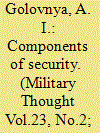

|
|
|
|
|
| Publication |
2014.
|
| Summary/Abstract |
The paper examines the issues of institutionalizing security in post soviet Russia. It offers analyses of the historical practice of establishing security related state institutions and their work.
|
|
|
|
|
|
|
|
|
|
|
|
|
|
|
|
| 6 |
ID:
132017
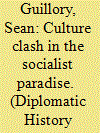

|
|
|
|
|
| Publication |
2014.
|
| Summary/Abstract |
The encounters between Soviet citizens and African students studying in the Soviet Union in the sixties inevitably generated problems of acclimation, social and political conflict, and racial strife. The article illuminates the ways the cultural clash affirmed Russians' and Africans' sense of cultural superiority. The African presence in Russia confirmed Soviet altruism in rearing Africans into cultured and scientifically endowed people. Similarly, African encounters with Soviet daily life reaffirmed their identity as culturally superior to Russians by emphasizing aspects of the individual that directly conflicted with Soviet notions of collectivism. The conflict over culturedness had direct ramifications on the Cold War as it strengthened Africans' pragmatic stance toward Soviet patronage and their reluctance to embrace Soviet ideology and values.
|
|
|
|
|
|
|
|
|
|
|
|
|
|
|
|
| 7 |
ID:
131018
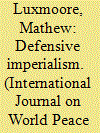

|
|
|
|
|
| Publication |
2014.
|
| Summary/Abstract |
This article examines Russia's approach to the post-Soviet space in relation to domestic stability during
I'utin's first two terms. It identi?es three dimensions of security which underpinned foreign policy during
this period-ideological, economic, and mi1itary~and demonstrates how each interacted with policies on the domestic front. Assessing Rnssia's response to Ukraine's Orange Revolution, it shows how the events of 2004 initiated a shift towards insulation from perceived external threats to political stability. A policy of "defensive imperialism" emerged whereby offensive actions abroad were aimed fundamentally at facilitating a stable external environment to politically safeguard the regime. The article concludes with a brief assessment of developments since 2008, and offers a pessimistic prognosis of the impact this trend will have on Russia's domestic stability and its international relations.
|
|
|
|
|
|
|
|
|
|
|
|
|
|
|
|
| 8 |
ID:
134115
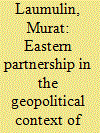

|
|
|
|
|
| Publication |
2014.
|
| Summary/Abstract |
The Eastern Partnership (EP) program should be viewed as another attempt to reformat the post-Soviet space along anti-Russian and anti-Eurasian lines and a response to Moscow's integration activities. This is not the first attempt of its kind: the West has already tried other geopolitical and geoeconomic tools. The final aim, however, has remained the same: Russia's domination and possible integration of post-Soviet regions irrespective of form, even economically adequate, should be prevented by all means.
|
|
|
|
|
|
|
|
|
|
|
|
|
|
|
|
| 9 |
ID:
130903
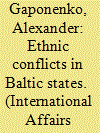

|
|
|
|
|
| Publication |
2014.
|
| Summary/Abstract |
To my mind, the European Union - EU was planned as strictly an economic union and its founder did not plan right from the start to form a single European community of nations or even a European civilization of a higher level.
|
|
|
|
|
|
|
|
|
|
|
|
|
|
|
|
| 10 |
ID:
130904
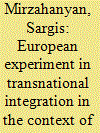

|
|
|
|
|
| Publication |
2014.
|
| Summary/Abstract |
The theme is one for political science rather than cultural studies. To talk about supranationality and not to talk about identity is impossible, because these concepts are interrelated. Supranationality is a terms that has recently comes into vogue in the mainstream domestic socio-political discourse. This is due primarily to the perspective of the creation in the post Soviet space of a new integration construct the European Union.
|
|
|
|
|
|
|
|
|
|
|
|
|
|
|
|
| 11 |
ID:
130899
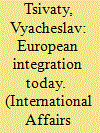

|
|
|
|
|
| Publication |
2014.
|
| Summary/Abstract |
It so happens that we are witnesses to the great geopolitical changes, where one political and economic system is replacing another, where the boundaries of political regions and alliances are shifting, and where the system of international relations is institutionalizing, integrating and transforming. A key characteristic that defines the development vectors of countries in the post- Soviet space is the search by newly independent states for an attractive integration nucleus. On the whole, from all indications, the process of the formation of a more or less stable system of foreign political ties between the post-Soviet states is complete. This accounts for the prevalence of the selective integration vector, namely, the fact that collaboration along the lines of the Customs Union and the EU has taken center stage.
|
|
|
|
|
|
|
|
|
|
|
|
|
|
|
|
| 12 |
ID:
131789
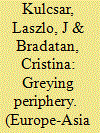

|
|
|
|
|
| Publication |
2014.
|
| Summary/Abstract |
The impact of ageing on community well-being has been part of the policy discourse in the West, but it is a relatively new problem for the post-socialist countries in Eastern Europe. This study focuses on the patterns of ageing in rural Romania and Bulgaria, offering a holistic view of vulnerabilities, including persistent rural disadvantages, ageing in the countryside and the post-socialist transformation. Aggregate Statistics and community case studies reveal the links between demographic processes and community development. This paper contributes to the country-specific analysis of the ageing European periphery in the context of social cohesion as a fundamental European goal.
|
|
|
|
|
|
|
|
|
|
|
|
|
|
|
|
| 13 |
ID:
127422
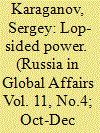

|
|
|
|
|
| Publication |
2013.
|
| Summary/Abstract |
The main reserves for Russia's foreign policy and its influence in the next decade lie more than ever in internal development. And this is also where the main threats are, fraught with the risk of losing political weight in the international arena and the status of great power.
|
|
|
|
|
|
|
|
|
|
|
|
|
|
|
|
| 14 |
ID:
130905


|
|
|
|
|
| Publication |
2014.
|
| Summary/Abstract |
THE INTEGRATION PROCESSES, which have passed to the stage of concrete implementation in the Customs Union format, are now, in a sense, an indicator of stability for the member countries' national and state identity. A policy of ethnic tolerance and social solidarity ensures domestic stability. Kazakhstan's citizens are members of more than 100 ethnic groups and 17 religious confessions. Building a political nation has become the basis for shaping national andstate identity in Kazakhstan. A strong economy, ethnic and religious harmony, and patriotism are to be a response to the challenges of modernity.
|
|
|
|
|
|
|
|
|
|
|
|
|
|
|
|
| 15 |
ID:
131781
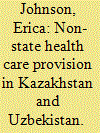

|
|
|
|
|
| Publication |
2014.
|
| Summary/Abstract |
Drawing on comparisons with cooperative and competitive non-state health care provision around the world, this article analyses non-state provision of health services in post-Soviet Uzbekistan and Kazakhstan. It explores the conditions in which non-state provisions remain cooperative or become politicised and contrasts the relations between NGOs and the state in Uzbekistan and Kazakhstan and the way they became politicised in the Middle East. In contrast to Western conceptions of NGOs, Central Asia's health NGOs cooperate with state agencies to serve their constituencies. In contrast to the perceptions of Central Asian governments, health-oriented NGOs do not aim to politicise health care. Donor support to Central Asia's health NGOs has created civically oriented actors that fill gaps in the state's capacity and enable governments to better serve their populations.
|
|
|
|
|
|
|
|
|
|
|
|
|
|
|
|
| 16 |
ID:
131787
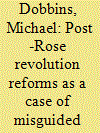

|
|
|
|
|
| Publication |
2014.
|
| Summary/Abstract |
This article traces political and institutional developments in the Republic of Georgia after the Rose Revolution. Particular focus is placed on efforts by Georgian policy-makers to align Georgian political institutions with Western models. Drawing on the concept of policy transfer, the author demonstrates various pitfalls in this process. Based on the gathered evidence, it appears that Georgian policy-makers engaged in various processes of 'incomplete transfer', compounded by a lack of understanding or deliberately false conceptions of Western institutions. Despite democratic rhetoric and interlinkages with the West, Georgia moved to a novel form of 'hyper-presidentialism' and dismantled institutional checks and balances. Hence, the Rose Revolution initially served to reinforce the already existing institutions of 'patronal presidentialism' through a series of misguided institutional modifications. The author also discusses the outcome of the recent parliamentary and presidential elections, which may have ironically and accidentally further democratised the country.
|
|
|
|
|
|
|
|
|
|
|
|
|
|
|
|
| 17 |
ID:
122366


|
|
|
|
|
| Publication |
2013.
|
| Summary/Abstract |
Eurasia is not the same as the post-Soviet space, and its borders cannot be regarded as fixed once and for all by the Soviet past. Whereas the post-Soviet space can indeed be the best region for integration in certain aspects, other options might envision a different combination of countries.
|
|
|
|
|
|
|
|
|
|
|
|
|
|
|
|
| 18 |
ID:
132011
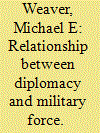

|
|
|
|
|
| Publication |
2014.
|
| Summary/Abstract |
Diplomacy and military force mutually support each other as instruments of national policy, functioning better in concert rather than as separate entities. The Cuban Missile Crisis is a useful case study of policymakers utilizing force and diplomacy synergistically. State Department efforts prior to the crisis paved the way for a unified front with Latin American neighbors against the emplacement of Soviet missiles in Cuba. With a backdrop of nuclear threats supporting the more usable capabilities of conventional air strikes, invasion forces, and blockading ships, the American threat of force made a negotiated settlement attractive to the leadership of the Soviet Union. The risks and political damage commensurate with the use of force encouraged the Kennedy administration to pursue a diplomatic solution. Military leaders tended to not consider the political effects of the use of force. President Kennedy understood the interrelationships between force and diplomacy, as did State Department leaders.
|
|
|
|
|
|
|
|
|
|
|
|
|
|
|
|
| 19 |
ID:
130906
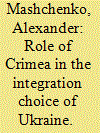

|
|
|
|
|
| Publication |
2014.
|
| Summary/Abstract |
I SHARE the greater part of apprehensions voiced here in connection with a possible signing of the Association Agreement between Ukraine and the EU. This will be a heavy blow to Ukrainian and Crimean economies. I want to draw your attention to the fact that without Crimea the situation in Ukraine could have been worse or even much worse. It is Crimea and its people who kept Ukraine within the Russian World and prevented the final rupture. In a way, the transfer of the peninsula to Ukraine was in the interests of Russia. Having sacrificed Taurida, it retained Ukraine in the field of its political and cultural attraction. I do hope that sociologists, political scientists, political technologists, and politicians will agree that the majority of the Crimean population would have voted for a membership in the Customs Union at a referendum on Ukraine's civilizational (integration) choice had it been organized. Let us hypothesize how would the deputies of the Supreme Rada of Ukraine who represent Crimea in this highest legislative structure vote at a referendum or in the Rada.
|
|
|
|
|
|
|
|
|
|
|
|
|
|
|
|
| 20 |
ID:
106115


|
|
|
|
|
|
|
|